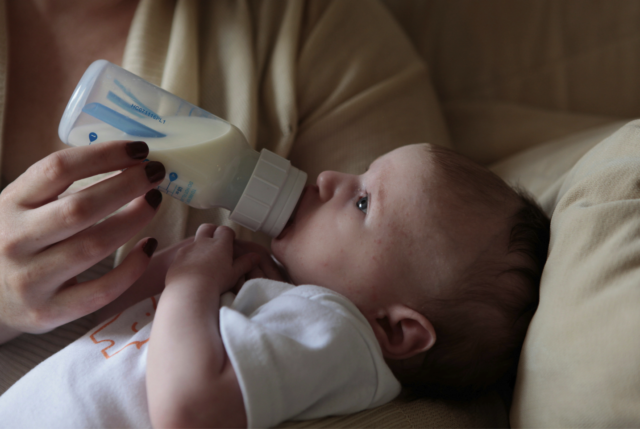Baby formula has come a long way, offering a safe and effective alternative for parents who can’t or choose not to breastfeed. However, as formula options multiply, so do the complexities of choosing the right one.
WHO raises serious concerns about the marketing practices the $55 billion formula industry employs. These tactics undermine child nutrition and violate international agreements. Formula companies are using concerning tactics, bombarding parents with ads and sponsoring advice networks that might be biased. They also offer promotions and gifts that may not address a baby’s specific needs.
Perhaps most concerning is the attempt by some formula companies to influence the training and recommendations of healthcare professionals. WHO warns of misleading marketing tactics used by the formula industry. These tactics lack scientific evidence and violate international guidelines for promoting breast milk substitutes.
In this article, we’ll cut through the noise to empower parents with the information they need to make informed choices about their baby’s formula. We’ll delve into the intricacies of modern formulas, exploring everything from nutritional content and ingredient transparency to potential health concerns.
Understanding Nutritional Needs
Choosing the right formula requires a deep dive into your baby’s nutritional needs at different stages. It’s like deciphering a complex code: you must consider the ideal balance of protein, fat, carbohydrates, vitamins, and minerals. As per Mount Sinai, breast milk offers ideal infant nutrition for the first six months, providing all necessary nutrients.
However, for parents who are unable to breastfeed or choose not to, modern infant formulas offer a safe and effective alternative. These formulas are meticulously crafted to mirror breast milk’s composition as closely as possible. Formula supplies vital nutrients for your baby’s growth, including proteins, fats, and carbohydrates, alongside essential vitamins and minerals for overall development.
While formula manufacturers strive to replicate breast milk, there are key differences. Breast milk contains antibodies that act as a natural defense against infections. Additionally, breast milk’s composition isn’t static; it adapts to meet a baby’s changing needs throughout the day.
Exploring the Ingredient List
Ever stare at a baby formula label and feel like you need a decoder ring? You’re not alone. Ingredient lists can be a mystery, leaving parents wondering exactly what their baby is consuming. It is where the quest for ingredient transparency becomes crucial.
Parents must avoid potential culprits, such as allergens, unnecessary additives, or anything that might raise a red flag for their baby’s health. Choosing formulas with clear ingredients is the key to confident feeding and avoiding unwanted sensitivities.
Formula Regulations and Certifications
Choosing a formula can feel like navigating a maze, but regulations and certifications are there to guide you. These standards set by official bodies, like the FDA, ensure the formula meets strict safety and quality requirements.
Think of it as a thumbs-up from the experts. Additionally, certain formulas may have certifications from independent organizations. These certifications offer an additional layer of confidence, ensuring the formula’s safety and ability to deliver the necessary nutrients for your baby.
Exploring Formula Options
Choosing a formula isn’t just about the nutrients it provides – it’s also about finding one that fits your family’s lifestyle. HealthyChildren.org mentions three main options to consider.
- Powdered formula is the most budget-friendly and has the longest shelf life, but it requires careful measuring and mixing with water.
- Liquid concentrate offers a middle ground, needing dilution with water but often coming pre-measured for easier preparation.
- Ready-to-feed formula is the ultimate in convenience – no mixing needed, just pour and feed. However, this ease comes at a premium cost and it doesn’t store as long as the other options.
Ultimately, the best formula type depends on your priorities. Consider factors like storage space, how much time you have for preparing bottles, and, of course, your budget.
Formula Feeding and NEC in Premature Babies
Necrotizing enterocolitis (NEC) is a rare but very serious intestinal condition that can strike premature infants. Some studies link certain formulas to NEC in preemies, but the exact cause remains under investigation.
It’s essential to discuss your premature baby’s specific needs with your doctor. They may recommend specialized formulas designed to reduce the risk of NEC. These formulas might be different from standard formulas in terms of ingredients or breakdown of nutrients.
Parents must note that legal concerns have been raised surrounding NEC and formula feeding. TorHoerman Law reports that legal actions have been initiated against manufacturers of infant formula.
These lawsuits claim formula makers knew (or should have known) about a possible link between cow’s milk formula and NEC in preemies. They further claim the manufacturers didn’t inform parents or doctors of this possible risk.
There have been significant developments in lawsuits related to NEC and baby formula. A recent NEC lawsuit update from May 1st, 2024 indicates a surge in pending cases. There are currently 496 cases, with 43 new filings in the past month alone. Recently a court case also awarded $60 million to a family whose premature baby developed NEC after using formula made by Mead Johnson.
This surge in legal action and the hefty verdict highlight the growing concern surrounding NEC and its possible link to certain infant formulas. It underscores the importance of discussing any formula concerns with your pediatrician, especially for premature babies.
Addressing Allergies and Digestive Issues in Formula
Just like adults, some babies can be allergic to certain ingredients in the formula, particularly cow’s milk protein. This can cause a range of problems, from fussiness and gas to vomiting and diarrhea. If you suspect your baby might have a formula allergy or sensitivity, it’s important to talk to your pediatrician. They can help you identify the specific ingredient causing the issue and recommend the best course of action.
The good news is there are specialized formulas designed for sensitive tummies! These formulas may be:
- Hypoallergenic: These formulas break down the protein molecules in cow’s milk into smaller pieces, making them less likely to trigger an allergic reaction.
- Soy-based: For babies allergic to cow’s milk protein, soy-based formulas can be an alternative. However, it’s important to note that some babies may also be sensitive to soy.
- Lactose-free: Lactose is a sugar found in milk. If your baby has trouble digesting lactose, a lactose-free formula might be the solution.
Frequently Asked Questions
Is formula safe for my baby?
Modern formula is a safe and well-regulated alternative to breast milk for many infants. However, it’s important to choose a formula that meets your baby’s specific needs and consult your pediatrician for guidance.
Are there any ingredients I should avoid in the formula?
Some babies may have allergies or sensitivities to certain ingredients like cow’s milk protein. Discuss any concerns with your pediatrician, who can advise on hypoallergenic or specialized formulas if needed.
What are the regulations around baby formula?
Infant formula is subject to strict safety and quality standards set by regulatory bodies like the FDA. Look for formulas that comply with these standards for added peace of mind.
In conclusion, the modern formula provides a safe and valuable option for feeding babies when breastfeeding isn’t possible. Understanding ingredient choices, potential concerns, and regulations equips parents to make informed decisions for their child’s health. Remember, your pediatrician is always your best resource for personalized guidance on your baby’s formula needs.
By Chris Bates










